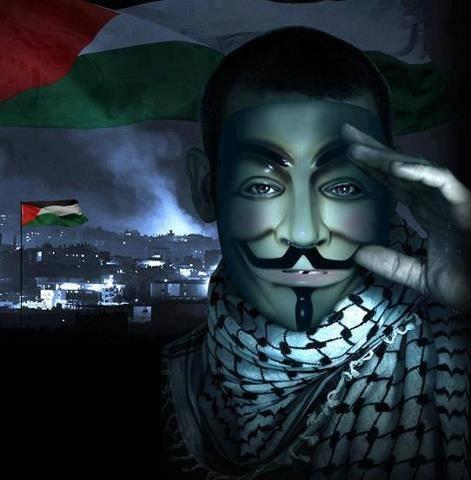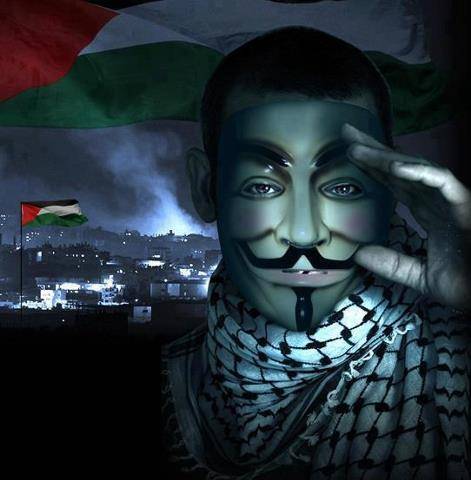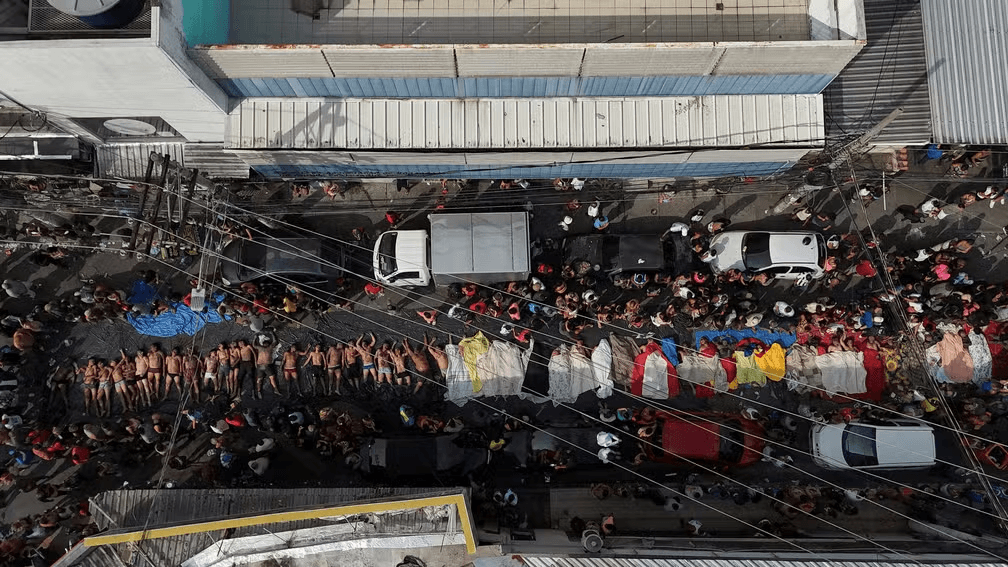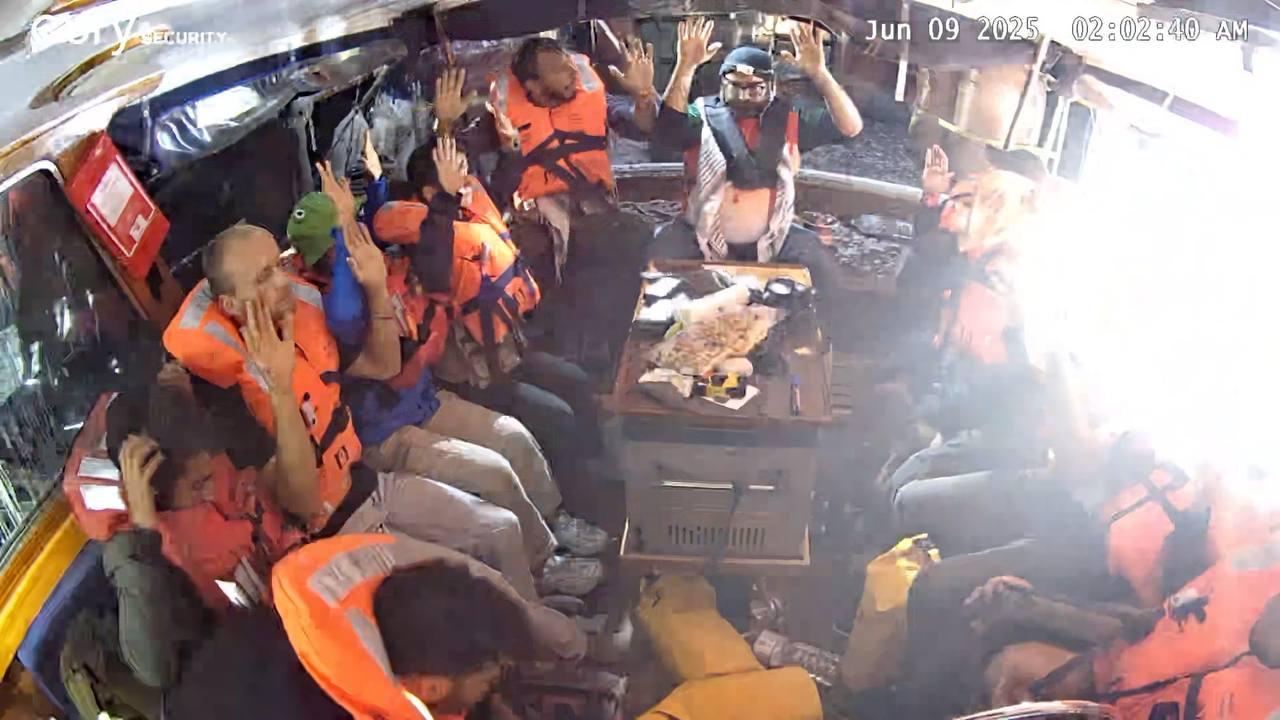
#OpIsrael reloaded: «TelAviv is not invulnerable». Chatting with digital intifada

Shortly after a conflict a war of numbers always bursts. OpIsrael’s second part doesn’t seem an exception to this rule. How many websites were overran by the wave of cyber – attacks that Anonymous unleashed against Israeli IT infrastructures since 7 April? Has it really been a failure as Tel Aviv’s government stated? What is the amount of the economic damage? While the operation is still running, Infoaut tries to read between the lines by interviewing some of the active protagonists on the battleground. Sync, black and anon4 are three hackers that have taken part in the assault against Israeli internet in the past days. This is what they told us.
IFF – Anonymous, even though reluctantly and with some inner tensions, officially decided to conform to the truce that Israeli and Palestinian authorities signed on 21st November 2012. The attacks that began on Saturday and those of the last few weeks (as the leak against Mossad) let us think of an action pondered for a long time. How did the debate about OpIsrael develop within your group in the last months? Which political goals did you set for yourselves? The context is different in comparison with November: at that time OpIsrael has been a reaction to the Zionist military operation against Gaza. Nowadays, on the contrary, you have made the first move announcing the operation one month ago, at the same time of the Holocaust Memorial Day. Why have you decided to start OpIsrael’s second phase?
Black – Because Israel keeps its hold on Gaza without giving up.
Anon4 – The debate has always been swinging between those who wanted to respect the truce, and those who wanted to take action with a view to 7th April. Surely, many people have continued to act as individuals or joining other teams. 7th April was decided because it is the Holocaust Memorial Day. We wanted to reframe the meaning of this symbolic anniversary in order to readjust it to the current situation that Palestinian people is forced to live in by Israeli savagery. Holocaust was not just the one that involved Jews: Holocaust is also the genocide committed by Zionist hands.. Today this word is more actual than ever. We decided to give a new impulse to the operation because of the continuous abuses and vexations towards the Palestinian people (even during the truce). There are a lot of examples regarding those. First of all, the terrible situation of Palestinian prisoners in Israeli jails: an out – and – out, total violation of human rights. Not to mention the case of Samer Issawi, on hunger strike as a form of protest, whose life is seriously in danger.
Sync – Obviously the strikes on Gaza last week have quickened the agenda. But, in my opinion, there is no target, no request, no hope. We are not influential enough to give ultimatums and surely Israel is not going to be intimidated by us. In my opinion this action aims more to create a media impact and a disruption in their infrastructures, besides reaffirming and making them clear they are not untouchable.
IFF – Which have been the most important targets you managed to hit?
Black – We have a list. They are too many to be listed.
Sync – Eh! It is very complex to provide a detailed report. DdoS are uncountable by now. So are defacements, even because there have been mass defacements carried out by crews that revolve around Anons, even though maintaining their own positions.
Anon4 – Probably, among the targets on the list we pointed out to you, the most important are governmental ones and the banks. And the website of the IDF military procurement, too: it is a highly symbolic target. The tango down against Mossad has been crucial: a multitude of botnets and individuals demolished their website as a revenge against Zionist regime. We have basically bombarded any possible .gov target and the portals of Israeli Internal Affairs, Finance, Foreign Affairs and Security Authority have been defaced: the digital perimeter of Zionist government’s websites has been violated. In our opinion, this helps to transmit a clear message: you are not invulnerable.
IFF – Besides the actions that you typically carry on (such as Ddos, leaks and defacements), this time you took possession of thousands of Facebook accounts of individual Israeli citizens. Why did you opt for this kind of action?
Black – Because the purpose was to «destroy Israel». This is the reason.
Anon4 – I didn’t deal with Facebook, but I think that those who made it wanted to emphasize the origin of the accounts. Even though, obviously, not all Israeli people are Zionist.
Sync – Neither did I join this side of the Op. But, anyway, the purpose was to put under pressure Israeli citizens. Maybe they will understand what it means to feel stalked and under siege as Gazawi people do everyday. Sure, not everyone of them is Zionist! But the fact that Netanyahu was elected again lets me think that the opinions of the majority are not really sensitive to the Palestinian issue. Facebook accounts’ violation? I would define it as a “collateral damage”: exactly the phrase that Israel uses to mention the Palestinian civilians that come under their “surgical strikes”. Which are not surgical at all.
IFF – The action have been announced for more than a month: OpIsrael 2 was effectively met with a great media attention. Predictably Israel (one of the most advanced countries in cyberwarfare technologies) took its countermeasures. Yitzhak Ben Yisrael, from Israeli National Cyber Bureau, stated that “damage has been limited” and that “Anonymous has not the necessary expertise to damage national vital infrastructures, otherwise it would have not announced the attack. It wants to spark media outcry on issues they care about”. How do you comment these statements?
Black – Sure! And then why did they close gate 80 on all the .gov.il websites? They are only trying to minimize. As all governments always do when they get attacked by Anonymous.
Sync – This time, back from the first OpIsrael experience, they are approaching the matter differently. On one hand, they try to play down the repercussions of the attack, and on the other hand they emphasize the fact that it is more a protest than a cyber attack. They have resources and know – how and they are able to soften or deflect most of the attacks, but surely they are heavily affected – even only for what concerns the employment of human resources they had to muster to deal with us. Not to mention the many financial/bank and public information services that have been severely hit, even though for variable periods.
Anon4 – Undoubtedly they are very prepared and they own all the necessary tools to defend themselves. But we could answer mentioning all the attacks with a successful conclusion. Then obviously… They are using the fire extinguisher to try to blow out the flames: Israeli government can do nothing but trying to belittle such a great storm. Anon scares because it is irrepressible: you don’t how and when it could act, where and how Moreover, there is the economic damage.
IFF – That you would quantify in the numbers of…?
Black – Figures? I don’t know.
Anon4 – Some sources talk about two or three billions dollars.
Sync – Yes but it would be better not to hazard a guess.. It would be difficult to do a truthful analysis. Rumours talk about numbers very – maybe too much – high. In any case, we know that Israel opened a direct line with Cisco to have at its disposal people skilled about networking. Someone helping them use at their best the equipment they already own in order to increase their security levels through the implementation of particular techniques (such as packet scrubbing).
IFF – This operation have been joined by at least twenty crews from the most different linguistic, cultural and ideological backgrounds. How did you manage to keep together component such as RedHack (whose imprinting is strongly Marxist) with others, maybe more oriented to iconographies and practices attributable to the Islamic militant world?
Anon4 – Let’s start from the fact that the numerous teams coordinated themselves in order to achieve a common purpose, which was to provoke an economic and symbolic damage to Israeli Zionist infrastructures. This is what a “macro” analysis shows. In addition, actions like these often imply a long series of “sub-goals”. I’m going to explain it better. You have just mentioned RedHack: the battle they carry on is lacking religious components and aims to attack the Israeli Nazi – Zionist – capitalist regime. It’s clear that the question changes with groups having a strong religious militant component: as regards them, the say “one people, one secular socialist state” is not valid. It is just as certain that such “sub-goals” nevertheless emerge in those operations in which single groups are the protagonists. This is less valid for broad reach operations like #OpIsrael where, in my opinion, the core message is “Free Gaza, Stop the genocide of Palestinian people, end the occupation!”. How is it possible to combine the action of the different teams? As I have just said, by acting for a common purpose. But let’s be careful: this does not mean that in the name of a collective goal we are going to sacrifice determinate values. In fact, we stand aloof from Nazi groups that take the chance to attack Israel in the name of anti – Semitism. Neither Anonymous, nor RedHack or other groups that are inspired by the values of freedom and equality could ever cooperate with these subjects.
IFF – It seems to be confirmed that the IDF acted on the human element to limit the damages of the attack, carrying out a sequence of arrests of hacktivists in the Gaza strip while it was ongoing. Do you think it was an isolated fact, maybe connected to the exceptional situation, or that law enforcement agencies could decide to resort to this kind of expedients more frequently in the future, to hinder cyber attacks? A hypothesis like this was presented by Michael Peck, a Forbes magazine collaborator who, on the occasion of RedHack’s attack to the Mossad, asked himself which response could adopt the latter, given its modus operandi and «its long story in deadly operations, including murders».
Sync – I don’t think that hacktivists/hackers unwelcome in Israel risk extensive and targeted persecutions, tortures or drone strikes: it would be “bad press”. I also think that arresting already known people or individuals suspected to have carried on cyberwarfare actions against Israeli state is counter – productive, as it will inevitably strenghten the opinions that many people have about the proactive, brutal and inhuman methodologies that Zionists use to prosecute their enemies or those that are perceived as such. They are only flexing their muscles to discourage any possible new participants. I think that these retaliations by the IDF mean only one think: that they are butthurt and that the damages we are causing to them are more significant than they want to admit.
Black – In my opinion it is an isolated case: this has been a great operation joined by many hacker teams. At the moment I don’t know about the number of hacktivists taken into custody: to sum it up the best thing would be to observe the developments in the next days.
IFF – How long will the operation last?
Anon4 – It is impossible to say.
Sync – No idea. ‘Till we get bored :). Anyway we have to say that Israelis are blacklisting single IPs, whole classes and, in extreme cases, all the IP ranges not allocated to Israel in order to appease DDos attacks in particular.
Anon4 – How clever.
Black – Yeah.
Sync – These are effective but drastic methods. They have repercussions even for legitimate users. And in any case they are a damage to their image: it is like saying that, in order to prevent people from making graffiti on my home wall, I demolish it. It seems like our means are not that ineffective, isn’t it?
Infofreeflow (@infofreeflow) for Infoaut
Ti è piaciuto questo articolo? Infoaut è un network indipendente che si basa sul lavoro volontario e militante di molte persone. Puoi darci una mano diffondendo i nostri articoli, approfondimenti e reportage ad un pubblico il più vasto possibile e supportarci iscrivendoti al nostro canale telegram, o seguendo le nostre pagine social di facebook, instagram e youtube.




















